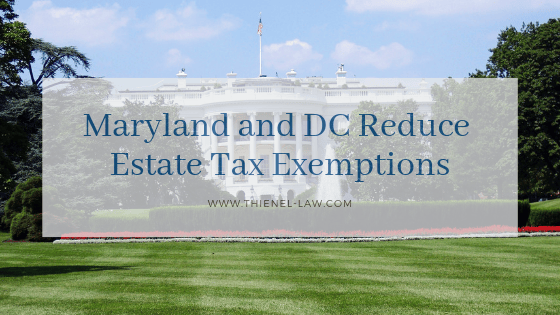Maryland and DC Reduce Estate Tax Exemptions
In the Tax Cuts and Jobs Act of 2017, Congress greatly increased the federal estate tax exemption. The tax bill doubled the federal estate tax exemption to $11.18 million for 2018. At the time of passing the tax bill, Maryland and DC intended to match the federal estate tax exemption amount. DC was set to match the federal estate tax exemption in 2018 and Maryland would match the federal exemption amount in 2019.
However, this is no longer the case. Our Maryland estate-planning attorney explains in further detail below.
Maryland’s Estate Tax Exemption
Maryland was gradually increasing its estate tax exemption each year, according to a 2014 law. For example, the estate tax exemption for individuals who died in 2017 was $3 million. In 2018, Maryland increased the estate tax exemption for individuals dying in 2018 to $4 million. By 2019, the state was expected to increase the estate tax exemption to match the federal estate tax exemption. However, that has now changed since the federal government surprised the state with such a large increase in the federal estate tax exemption.
According to legislation passed by Maryland lawmakers on April 5, 2018, the estate tax exemption in Maryland is now limited to $5 million for 2019 and beyond.
DC Estate Tax Exemption
DC also decided not to increase its estate tax exemption to the federal exemption. Ten of the thirteen DC City Council members agreed on a bill in February 2018 that would set the DC estate tax exemption for 2018 at $5.6 million. The provisions were later included in DC’s Budget Support Act, which was enacted in September 2018. In addition to setting the estate tax exemption at $5.6 million for DC, the law also allows for the exemption to be increased for inflation in future years.
One difference between DC and Maryland’s laws for estate tax exemptions is that the DC law makes the estate tax exclusion amount of $5.6 million retroactive back to January 1, 2018.
Reducing or Eliminating Estate Taxes
Even though DC and Maryland have chosen not to increase their estate tax exemptions to the federal estate tax exemption, individuals may still reduce or eliminate the estate taxes their heirs may owe through comprehensive estate planning. Ways individuals may reduce or eliminate estate tax includes:
Maximize lifetime gifts to children, grandchildren, and other heirs, including using the Uniform Transfer to Minors Act for transfers to minors
Consider establishing a charitable trust
If you have a loved one with special needs, establish and fund a special needs trust
Utilize a Family Limited Liability Corporation or Family Limited Partnership to hold title to certain assets
Create an Irrevocable Living Trust
Maximize the exception for generation-skipping transfers
Consider an AB Trust and maximize the benefits married couples have regarding estate planning to reduce estate taxes
Depending on your situation, you may have other options for reducing or eliminating estate taxes. Contact Thienel Law today to schedule a time to review your estate plan soon. Maryland estate-planning lawyer Steve Thienel is dedicated to assisting clients in Maryland, Virginia, and throughout the DC Metro area.

